CLAS 355
Masters' Attitudes & Practices; Lived Experience of Slaves
January 24, 2024
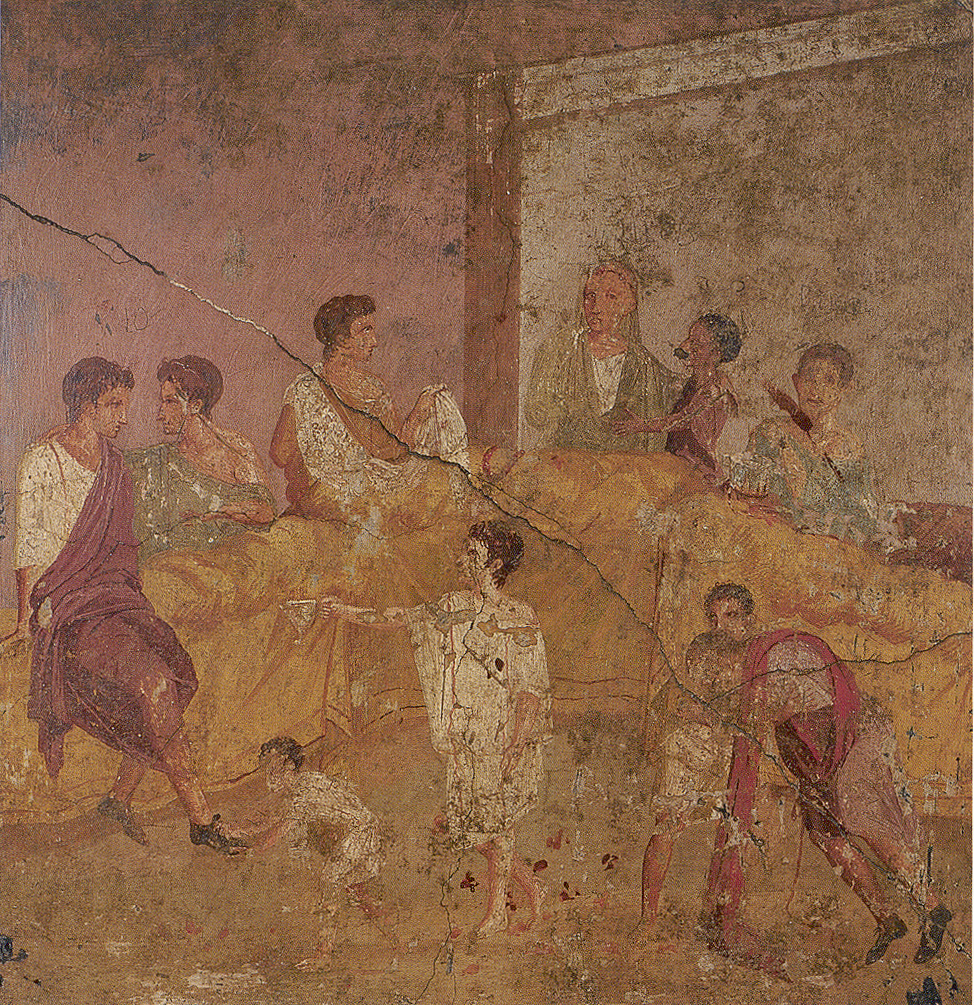
Dinner party, House of the Triclinium (Pompeii, 1st century CE)
Roman slaveholders' enslavement of others (ideological, psychological, cultural rationales) > normalizing & naturalizing slavery
1. slaves naturally inferior: foreigners, barbarians, enemies of Roman security & civilization: inferiority of character (lack of reason, self-control, dishonesty vs. master's reputed honesty, loyalty, hard work, etc.); master's moral superiority justifies control of otherly slaves
2. slaveholders' self-interest & narcissism (instrumentalism): slave an extension (prosthetic) of master, exists to serve master's will; slaves denied subjectivity, agency, inner experience; master entitled to slaves' devotion & loyalty; ideal slave (Edicts of Aediles) obedient, loyal, hardworking, thrifty, etc. > self-sacrifice, torture, suicide
3. paternalism, power, privilege (patriarchal society): "father knows best"; the slaveholder's household as orderly socio-political hierarchy/microcosm of state (Pliny); corporate body serving master's interests, power & social order (not individuals with basic freedoms, unalienable rights, etc.); paternalism strengthens & stabilizes institution > benevolent paternalism (vs. violence)
Varro (116-27 BCE), intellectual & slaveholder
Varro, On Agriculture 1.17.1 (categorizing 3 types of instruments that till land on villa)
. . . the class of tool which is articulate and that which is inarticulate and the mute; the articulate comprises the slaves [instrumentum vocale, "tool with a voice"], the inarticulate comprises the cattle, and the mute comprises the vehicles.
[cf. Aristotle, Nicomachean Ethics 1161b4, slaves as organa empsycha, "animate tools"]
- "golden mean" of enslavement (1.17.3): "slaves should be neither cowed nor high-spirited"; carrot over the stick (cf. Cato)
- vilicus: educated, older, knowledgeable, exemplary worker; "They are not to be allowed to control their men with whips rather than words, provided you can achieve the same result" (1.17.5); rewarded with peculium (plot of land, domestic animals + "wife" & children) – "by this means they are made more steady and more attached to the place"
- management style: consideration of vilicus' & laborers' ideas to win loyalty (1.17.6-7)
Seneca (ca. 4 BCE-65 CE), philosopher & slaveholder
- Stoicism: individual's search for wisdom & virtue (justice); stresses reason (freedom from emotion, passion, desire, etc.); self-reliance, strength in hardship, imperviousness to fortune/chance/circumstances > slavery & freedom "good to think with"
- Letters (addressed to pupil, Lucilius) emphasize philosopher's intellectual & moral self-development, self-improvement
- Letter 47: contradictions in enslavement of "tool with a voice" – slaves human, enslaved by chance, all human beings slaves to something; "just humble friends"
Seneca, Letter 47.10 (arbitrary condition of slavery)
Just think
that the fellow you call your slave was born free from the same seeds and enjoyed the same sky, breathed, lived, and died on equal terms! You are just as able to look on him as freeborn as he can look on you as a slave. In the defeat of Varus [Battle of Teutoburg Forest, 9 CE, German tribes under Arminius] Fortune laid low many men of splendid birth aiming at the rank of senator through military service; it made one of them a shepherd, another a janitor. So now go and despise a man whose fortune you may descend to while you are despising him.
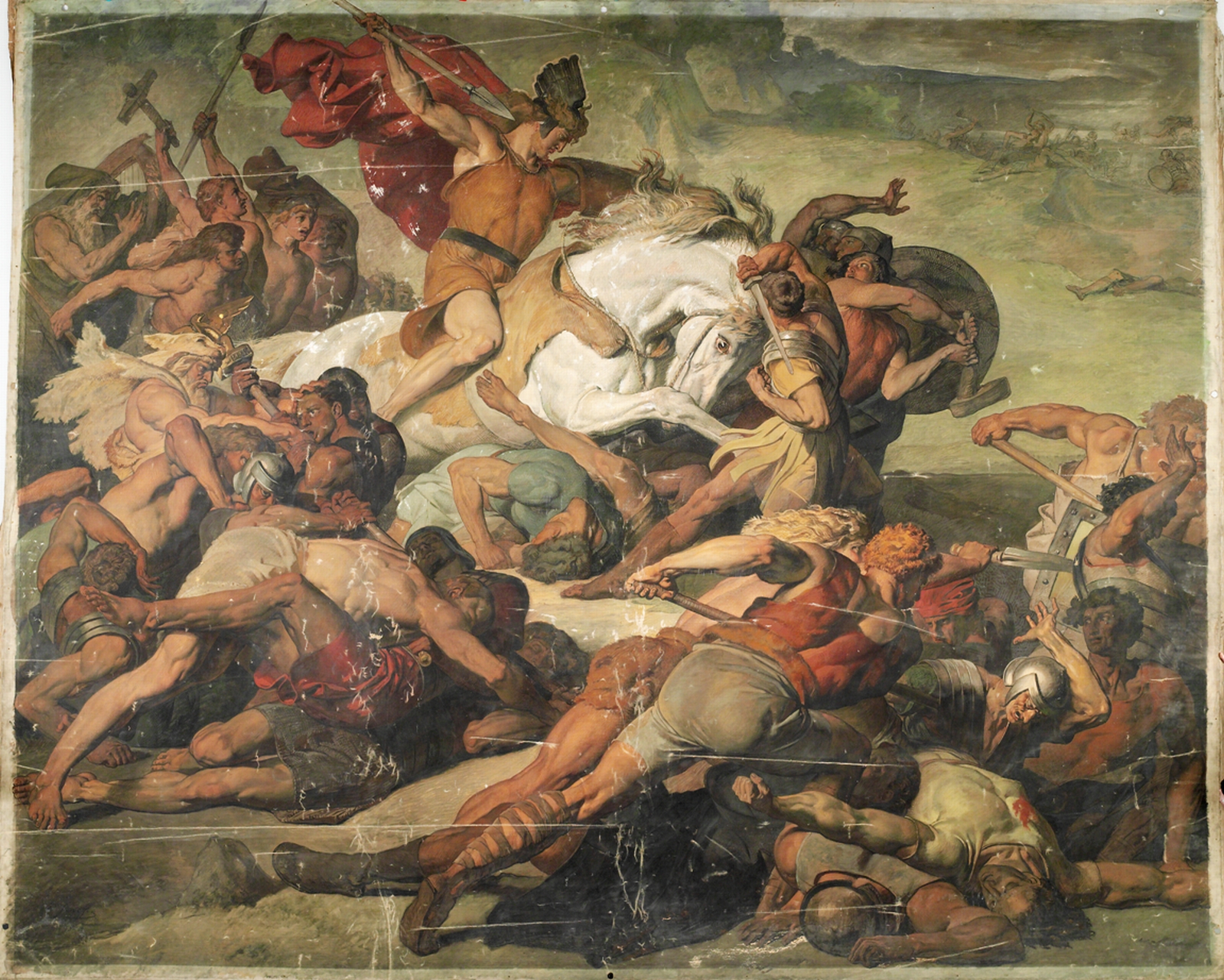
Janssen, The Victorious Advance of Hermann/Arminius (1873)
Seneca, Letter 47.18-19 (equality, endowment with unalienable rights?)
Someone will say I am now calling slaves to take the cap of liberty, and casting masters down from their heights, because I said 'let them pay respect to their master rather than fear him.' . . . The man who is paid respect is loved; love cannot be mixed with fear. So I judge that you are acting with absolute correctness in not wanting to be feared by your slaves, and using only verbal scolding; only animals are corrected by blows.
Seneca, Letter 47.4 (the master's self-interested goal of absolute loyalty)
But slaves who not only exchanged talk in front of their masters but with them, whose mouth was not gagged, were ready to offer their necks for their master and avert impending danger onto their own heads; they chattered at dinners but were silent under torture.
- institution of Roman slavery based on violence (applied or threatened); whipping, chains, restraints, torture, ergastulum = slave prison, confinement to mills & mines; cf. McCarter, "Seneca's 'Lost Cause'"
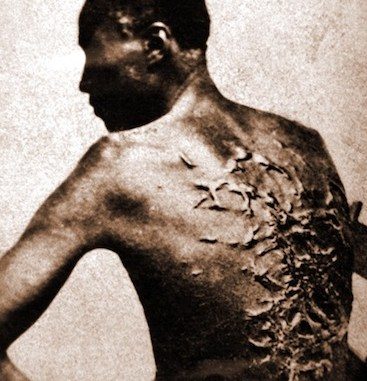
Photo of Union soldier & former slave
12 Years a Slave (2013), Oscar winning film based on Solomon Northup's memoir Twelve Years a Slave (1853); trailer: https://www.youtube.com/watch?v=z02Ie8wKKRg; whipping scene: https://www.youtube.com/watch?v=AO_DS2azJWU
Roman Slaves' Lived Experience
- adaptation, resilience & remediation (?) of trauma of natal alienation, etc.: families & unofficial marriages (contubernales, "tent-mates"), acting as legal families; acquisition of personal property (peculium) & entrepreneurship (urban slaves)
- variable experience: slave hierarchy (vicarius, "slave's slave"); epitaph of Musicus Scurranus (Tiberius), imperial treasurer in Gaul (16 slaves, e.g. household treasurer, doctor, cook, bedchamber slave)
- supportive communities of conservi ("fellow slaves"), sanctioned by master (grant of "social life"): usually occupational societies (collegium/a) with organizational structure > esp. burial, columbarium ("pigeon's nesting box")

Roman columbarium
Dedicatory plaques in the columbarium of the Statilii Tauri (Rome, 1st century BCE)
Sophro, slave of Sisenna Statilius, bookkeeper. Psyche his sister, and Optata his wife made this (CIL 6.6358).
Optata, slave of Pansa, doorkeeper. Her friends made this (CIL 6.6326).
Messia, Dardanian, spinner. Iacinthus, masseur, Dardanian, made this (CIL 6.6343).
Iucundus, slave of Taurus, litter-bearer. While he lived, he was a man (vir) and acted on behalf of himself and others. While he lived, he lived honorably (honeste). Callista and Philologus dedicated this (CIL 6.6308).
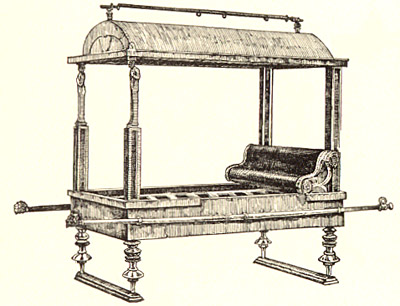
- slave resistance (assertions of power, personhood, agency & willfulness): actions to control labor, e.g. insolence, disobedience, duplicity/doublespeak, creating own walkways, stealing, lingering, witholding labor, escape, damaging property (including themselves!), killing masters (see Appendix example below)

Frederick Douglass
" . . . we were, therefore, reduced to the wretched necessity of living at the expense of our neighbors. We were compelled either to beg, or to steal, and we did both. I frankly confess, that while I hated everything like stealing, as such, I nevertheless did not hesitate to take food, when I was hungry, wherever I could find it. Nor was this practice the mere result of an unreasoning instinct; it was, in my case, the result of a clear apprehension of the claims of morality. I weighed and considered the matter closely, before I ventured to satisfy my hunger by such means. Considering that my labor and person were the property of Master Thomas, and that I was by him deprived of the necessaries of life, necessaries obtained by my own labor—it was easy to deduce the right to supply myself with what was my own. It was simply appropriating what was my own to the use of my master, since the health and strength derived from such food were exerted in his service. To be sure, this was stealing, according to the law and gospel I heard from St. Michael's pulpit; but I had already begun to attach less importance to what dropped from that quarter, on that point, while, as yet, I retained my reverence for religion. It was not always convenient to steal from master, and the same reason why I might, innocently, steal from him, did not seem to justify me in stealing from others." (My Bondage and my Freedom, 1855)
"Frederick Douglass on how Slave Owners Used Food as a Weapon of Control" (NPR story): https://www.npr.org/sections/thesalt/2017/02/10/514385071/frederick-douglass-on-how-slave-owners-used-food-as-a-weapon-of-control
"Mount Misery", home of slave-breaker Edward Covey, purchased by former Secretary of State Donald Rumsfeld: https://www.baltimoresun.com/news/bs-xpm-2006-08-20-0608200162-story.html
[cf. James C. Scott, Domination and the Arts of Resistance: Hidden Transcripts]
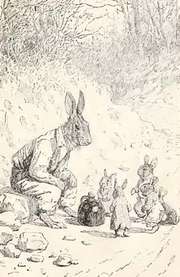
Brer Rabbit, the clever trickster (Uncle Remus)
**Appendix: Hostius Quadra, killed by his slaves (Seneca, Natural Questions 1.16.1)
There was a certain Hostius Quadra who turned his obscenity into a dramatic spectacle. The deified Augustus judged that this rich, miserly man, a slave to his own hundred millions, did not deserve to be avenged after he had been killed by his slaves; he virtually declared that he had been lawfully executed. His impurity was not confined to one sex, but he lusted after men as well as women. He made mirrors of the type I have just described, giving off greatly magnified images, to which a finger appeared longer and thicker than an arm. He arranged them so that, when he was submitting to a man with his back to him, he could see his partner's very movement in a mirror; and then he delighted in the illusory size of his member as though it were real. He used to go recruiting in all the bath-houses and selected men after sizing them up; but all the same he used to thrill his insatiable vice with deceptions as well. Go on, tell us that mirrors were discovered so that we could look presentable! It is disgusting to speak of what that monster, who ought to have been torn to pieces by his own mouth, said and did when mirrors were placed all around him, so that he could be a spectator of his own enormities and could fill not just his mouth but his eyes with things that burden the conscience even when kept secret, things that anyone would deny having perpetrated even to himself . . . he surrounded himself with mirrors in which he could distribute and exhibit his shocking acts; and because he could not watch so attentively when he had lowered his head and fastened onto someone else's groin, he displayed his efforts to himself in images. He watched the lust of his own mouth; he watched the men whom he admitted at all points simultaneously; sometimes he shared himself out between a male and females, and so he passively submitted his whole body to them, he watched those unspeakable acts. What on earth did that impure man leave to do in the dark? He was not afraid of the daylight, but he exhibited to himself, he commended to himself, those monstrous couplings. Would you not expect that he even wanted to have his picture painted in art? . . . that monster had turned his own obscenity into a spectacle, and he exhibited to himself things that no night is dark enough to hide. "I submit," he said, "to a man and a woman at the same time. Nevertheless even with the part of me that is so far redundant I act the man for someone's humiliation. All my members are occupied in acts of debauchery; let my eyes have a share in my lust as well and be its witnesses and inspectors. Even the things that are kept out of sight by the structure of our bodies should be made visible by technology, so that no one can think I do not know what I am doing . . . I shall surround myself with the kind of mirror that gives off incredibly large inages. If I could, I would make them real; since I cannot, I shall feed on the illusion. Let my obscenity see more than it is capable of; let it be astonished at things it submits to." What an outrage! He was perhaps killed too quickly, before he could see it: he ought to have been sacrificed in front of his own mirror!






